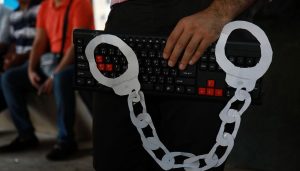By Walid Al-Saqaf, Chair of ISOC-Yemen
The economy is suffering, illiteracy levels are among the highest in the world, most of high school and university graduates struggle to find jobs, and most devastating of all, the security situation has turned to the worse with assassinations, kidnappings, and other violent activities continuing unabated. That is the state of Yemen today.
However, a part of the community that is actively engaged in attempting to reverse the country’s fortunes is the youths. The young generation of Yemen can prove to be the greatest asset that will get the country back on its feet, and this generation relies heavily on the Internet as a major catalyst for development. Especially interesting is the internet’s rich social networking experience, which has given young users relief and hope.
If the official launch of the Yemen chapter of the Internet Society is any sign, I believe there is reason to be hopeful. More than 200 persons attended the launch that took place in a rather remote part of Sana’a City, demonstrating the strong desire of Yemenis, particularly the youth, in having a stronger, more resilient, and more accessible Internet.
With Internet penetration at 15%, Yemen is ranked the second lowest country in the world. Yet, with 3.7 million users, Yemen has one of the leading positions in the region, giving it an edge over Jordan, Lebanon, and several Gulf countries
Why Now?
With so many problems facing Yemen, one of the questions posed at the event was ‘Why now?’ hinting at the many difficulties that Yemen currently faces. Indeed, there are severe water shortages, power outages have become the norm, and many Yemenis don’t dare leave their homes after midnight in fear of armed gangs. With these challenges in mind, why should Yemen invest time, energy, and money on the Internet?
As the chair of ISOC-Yemen, I find that this doubt is as an opportunity to bring to attention important aspects of Internet use that are often overlooked. With Internet penetration at 15%, Yemen is ranked the second lowest country in the world. Yet, with 3.7 million users, Yemen has one of the leading positions in the region, giving it an edge over Jordan, Lebanon, and several Gulf countries. If Internet penetration continues to grow, it would allow the Internet to have a greater role in creating change and fostering ideas that can ultimately help lift people from poverty.
Yemenis gain knowledge and skills from online courses and resources. Some have used the Internet to facilitate making a living, as they started their own businesses on social media platforms. Others used the internet to get hired for particular tasks that allowing them a decent living. The strong desire to use the Internet for development and entrepreneurship could be enumerated and presented in many great examples. Events such as TEDxSanaa, TEDxAden and Sanaa Startup Weekend highlight such successes.
So far, the Internet in Yemen has helped change lives on a personal level, despite it being slow, relatively expensive, and often unreliable. One could only start to imagine how Internet availability may trigger economic and social change if Yemen were to invest in it, introduce it to potential users, and make it accessible to areas that remain deprived from this resource until this very day.
It took many months of preparation and hard work within a multistakeholder model that allowed various key players in the country to join forces and establish ISOC-Yemen. By being directly affiliated to ISOC, the chapter gains international leverage and outreach, allowing it to have a say on regional issues that matter, and giving it an advantage in communication with global players. ISOC-Yemen is hence a step towards making Yemen a country more connected to the world. With a population of 25 million, of whom the majority are younger than 40, Yemen can become one of the fastest growing countries in terms of Internet penetration and use.
It is high time we open up the market and establish an environment of healthy competition and variable options, all with clearly defined conditions to protect consumers. Without competition, government-run services lag behind and do not provide services that the public and market need
Three Main Tracks
It is up to Yemenis to start taking bold and strategic steps, seize the moment, and use the Internet to its fullest potential. As ISOC-Yemen, we will attempt to achieve that through multiple tracks.
One track will engage with Internet service providers, the government, and policy-makers to end service monopoly once and for all. Internet service monopoly has proved unsustainable. Yemen is the only country in the region that does not have 3G connectivity and lacks many services taken for granted in the rest of the region. It is high time we open up the market and establish an environment of healthy competition and variable options, all with with clearly defined conditions to protect consumers.Without competition, government-run services lag behind and do not provide services that the public and market need.
The second track will focus on awareness. Yemenis need to wake up to the global information revolution that is taking the world by storm. It is unacceptable for students and teachers to not have email accounts and not understand what the Internet is and how it could be used. Lack of awareness results in many kids using the Internet exclusively for less productive purposes such as playing online games and watching movies and television programs. Internet usage should expand to include productive applications in research, education, knowledge and idea sharing, entrepreneurship, e-commerce, communication, and more.
The third track would involve transparency and e-government. Over the last few years in Yemen, lack of transparency led to corruption, which contributed to increasing poverty. An approach that has been useful in many countries is to implement new and effective e-government services to eliminate middlemen and fixers. Furthermore, having the government publish valuable and relevant information for public scrutiny, particularly through the local media, is useful for holding it accountable and ensuring that tax-payer money is spent appropriately. When citizens realize that they can get their paperwork processed more quickly online, they may embrace the Internet more readily. Yemenis can and will use the Internet when the opportunity is provided, as demonstrated by the online high school graduation grade system, which worked very well despite the lack of Internet access in some parts of the country.
There are various additional strategies planned for development. As a civil society organization, ISOC-Yemen can help shape the future of the Internet not only in Yemen, but also in the region. ISOC-Yemen’s membership base expanded to over 120 members in a few weeks, with a members base that represents various governorates and sectors of society. We anticipate further expansion in in the number of official members so as to exceed one thousand within the next few months. ISOC is soon establishing a Middle East bureau. We are hoping that Yemen could be one of prominent beneficiaries and partners, especially due to its pressing need for support, the great potential it has in the labor market, and its strategic location in the region when it comes to cable connectivity between Africa and the Arabian Peninsula.
The Bright Side
The youth of Yemen can in fact fundamentally change the country’s status from the least developed in the Middle East to the most competent, skilled, and fastest growing country in the region. Yemen possesses something that other oil-rich neighboring countries do not: a considerable youth population determined to rise up and defeat the odds with a spirit of hard work and dedication. The Internet could help make that a reality.
*Featured image from Shutterstock







